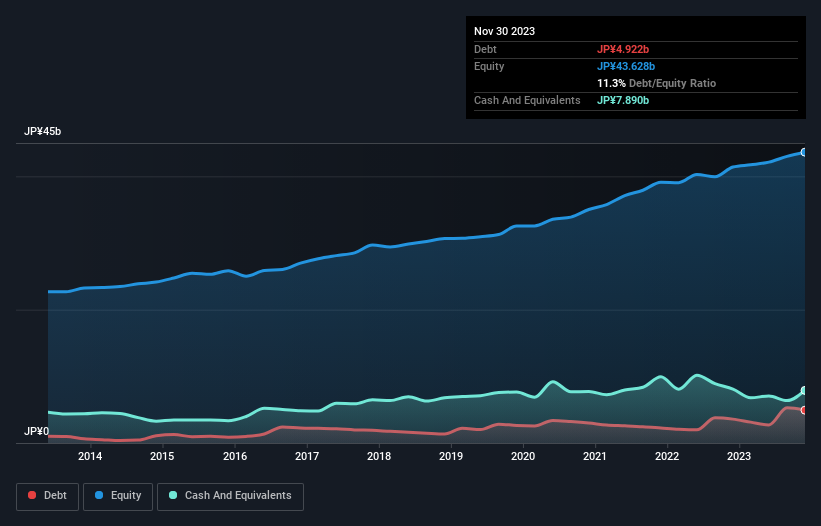We Think Osaka Organic Chemical Industry (TSE:4187) Can Stay On Top Of Its Debt

Legendary fund manager Li Lu (who Charlie Munger backed) once said, 'The biggest investment risk is not the volatility of prices, but whether you will suffer a permanent loss of capital.' So it might be obvious that you need to consider debt, when you think about how risky any given stock is, because too much debt can sink a company. As with many other companies Osaka Organic Chemical Industry Ltd. (TSE:4187) makes use of debt. But is this debt a concern to shareholders?
When Is Debt Dangerous?
Generally speaking, debt only becomes a real problem when a company can't easily pay it off, either by raising capital or with its own cash flow. In the worst case scenario, a company can go bankrupt if it cannot pay its creditors. However, a more usual (but still expensive) situation is where a company must dilute shareholders at a cheap share price simply to get debt under control. Of course, debt can be an important tool in businesses, particularly capital heavy businesses. When we think about a company's use of debt, we first look at cash and debt together.
View our latest analysis for Osaka Organic Chemical Industry
What Is Osaka Organic Chemical Industry's Net Debt?
You can click the graphic below for the historical numbers, but it shows that as of November 2023 Osaka Organic Chemical Industry had JP¥4.92b of debt, an increase on JP¥3.58b, over one year. But on the other hand it also has JP¥7.89b in cash, leading to a JP¥2.97b net cash position.

How Healthy Is Osaka Organic Chemical Industry's Balance Sheet?
According to the last reported balance sheet, Osaka Organic Chemical Industry had liabilities of JP¥7.10b due within 12 months, and liabilities of JP¥3.91b due beyond 12 months. Offsetting these obligations, it had cash of JP¥7.89b as well as receivables valued at JP¥8.33b due within 12 months. So it actually has JP¥5.22b more liquid assets than total liabilities.
This surplus suggests that Osaka Organic Chemical Industry has a conservative balance sheet, and could probably eliminate its debt without much difficulty. Succinctly put, Osaka Organic Chemical Industry boasts net cash, so it's fair to say it does not have a heavy debt load!
In fact Osaka Organic Chemical Industry's saving grace is its low debt levels, because its EBIT has tanked 40% in the last twelve months. When a company sees its earnings tank, it can sometimes find its relationships with its lenders turn sour. The balance sheet is clearly the area to focus on when you are analysing debt. But it is future earnings, more than anything, that will determine Osaka Organic Chemical Industry's ability to maintain a healthy balance sheet going forward. So if you want to see what the professionals think, you might find this free report on analyst profit forecasts to be interesting.
Finally, while the tax-man may adore accounting profits, lenders only accept cold hard cash. While Osaka Organic Chemical Industry has net cash on its balance sheet, it's still worth taking a look at its ability to convert earnings before interest and tax (EBIT) to free cash flow, to help us understand how quickly it is building (or eroding) that cash balance. Over the last three years, Osaka Organic Chemical Industry reported free cash flow worth 15% of its EBIT, which is really quite low. That limp level of cash conversion undermines its ability to manage and pay down debt.
Summing Up
While it is always sensible to investigate a company's debt, in this case Osaka Organic Chemical Industry has JP¥2.97b in net cash and a decent-looking balance sheet. So we don't have any problem with Osaka Organic Chemical Industry's use of debt. The balance sheet is clearly the area to focus on when you are analysing debt. But ultimately, every company can contain risks that exist outside of the balance sheet. These risks can be hard to spot. Every company has them, and we've spotted 1 warning sign for Osaka Organic Chemical Industry you should know about.
At the end of the day, it's often better to focus on companies that are free from net debt. You can access our special list of such companies (all with a track record of profit growth). It's free.
If you're looking to trade Osaka Organic Chemical Industry, open an account with the lowest-cost platform trusted by professionals, Interactive Brokers.
With clients in over 200 countries and territories, and access to 160 markets, IBKR lets you trade stocks, options, futures, forex, bonds and funds from a single integrated account.
Enjoy no hidden fees, no account minimums, and FX conversion rates as low as 0.03%, far better than what most brokers offer.
Sponsored ContentNew: AI Stock Screener & Alerts
Our new AI Stock Screener scans the market every day to uncover opportunities.
• Dividend Powerhouses (3%+ Yield)
• Undervalued Small Caps with Insider Buying
• High growth Tech and AI Companies
Or build your own from over 50 metrics.
Have feedback on this article? Concerned about the content? Get in touch with us directly. Alternatively, email editorial-team (at) simplywallst.com.
This article by Simply Wall St is general in nature. We provide commentary based on historical data and analyst forecasts only using an unbiased methodology and our articles are not intended to be financial advice. It does not constitute a recommendation to buy or sell any stock, and does not take account of your objectives, or your financial situation. We aim to bring you long-term focused analysis driven by fundamental data. Note that our analysis may not factor in the latest price-sensitive company announcements or qualitative material. Simply Wall St has no position in any stocks mentioned.
About TSE:4187
Osaka Organic Chemical Industry
Engages in the production and marketing of organic chemistry industry products, organic reagents, petrochemical products, and special polymers in Japan.
Flawless balance sheet with solid track record and pays a dividend.
Market Insights
Community Narratives




